Wang Yi Highlights Taiwan Issue During Talks with French Foreign Minister
Wang Yi emphasizes the Taiwan issue during high-level talks with French Foreign Minister, highlighting ongoing regional tensions.

Chinese Foreign Minister Wang Yi underscored the significance of the Taiwan question and reiterated Beijing's one-China policy during a phone conversation with French Foreign Minister Jean-Noel Barrot on Friday. Wang voiced firm opposition to NATO's involvement in Asia-Pacific affairs, calling for greater strategic mutual trust between China and France.
Highlighting the longstanding tradition of independence and autonomy shared by both China and France, Wang stressed the necessity for both sides to respect each other's core interests. He emphasized that the Taiwan question is an internal affair of China, directly impacting the nation's sovereignty and territorial integrity. Wang further asserted that the matter is fundamentally different from the Ukraine issue, drawing a clear distinction between the two cases.
Wang expressed appreciation for France's stance on the one-China policy, stating that China attaches "great importance" to this commitment. He voiced confidence that France would continue to convert this policy into concrete action moving forward.
Reiterating his concerns about security dynamics in the region, Wang urged France to continue upholding multilateralism and resist any efforts by NATO to interfere in Asia-Pacific affairs. He also called for both countries to work together to safeguard free trade and counter unilateral or bullying practices on the international stage.
The call follows a recent discussion between Chinese President Xi Jinping and French President Emmanuel Macron on May 22, where the two leaders reached a broad consensus on enhancing strategic coordination. Wang noted that to implement this agreement, both countries should prepare for more exchanges at various levels in the coming months.
As part of these efforts, Wang extended an invitation to senior French representatives to attend the World Artificial Intelligence Conference in Shanghai in 2025, highlighting the importance of deepening ties in emerging fields.
Both sides have also reached agreement on addressing economic and trade challenges through ongoing dialogue and consultation. Wang emphasized the value of expanding people-to-people, cultural, and educational exchanges, stating that such efforts are essential for promoting the healthy development of the China-France comprehensive strategic partnership and broader China-EU relations.
For his part, Barrot welcomed Chinese Vice President Han Zheng's upcoming participation at the UN Ocean Conference in France. He described the relationship between France and China as increasingly vital amid growing global uncertainty, reaffirming France's view of China as both a friend and partner.
Barrot reiterated France's steadfast adherence to the one-China policy and expressed eagerness to maintain high-level exchanges and close strategic communication with Beijing. He also recognized the importance of people-to-people and cultural exchanges, stating that such initiatives send a strong message of openness at a crucial time.
On the economic front, Barrot stated that France opposes trade and tariff wars, voicing a commitment to resolving any economic and trade frictions through consultation rather than confrontation.
During their comprehensive exchange, the two ministers also discussed pressing international issues, including the situations in Ukraine, Palestine and Israel, and Iran's nuclear program, reflecting the broad scope of China-France diplomatic engagement.




